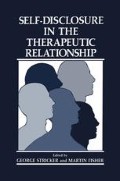Abstract
The Holocaust was woven into the fabric of life. It was always there. The natural tapestry of my life. It was my first memory. There was never a time in my life where there wasn’t an Auschwitz. It was very much a part of my life. Growing up I wondered what it was like not to be a child a survivor. It was always a way of splitting time. Before the war and after the war.
Access this chapter
Tax calculation will be finalised at checkout
Purchases are for personal use only
Preview
Unable to display preview. Download preview PDF.
References
Barocas, H., & Barocas, C. (1973). Manifestations of concentration camp effects on the second generation. American Journal of Psychiatry, 130, 820–821.
Barocas, H., & Barocas, C. (1980). Separation-individuation conflicts in children of Holocaust survivors. Journal of Contemporary Psychotherapy, 11(1), 6–14.
Bettelheim, B. (1960). The informed heart. New York: Avon Books.
Bruner, J. (1983). Child’s talk: Learning to use language. New York: W.W. Norton.
Bucci, W. (1982). The vocalization of painful affect, journal of Communication Disorders, 15, 415–440.
Bucci, W. (1984). Linking words and things: Basic process and individual variation. Cognition, 17, 137–153.
Bucci, W., & Freedman, N. (1978). Language and hand: The dimension of referential competence. Journal of Personality, 46, 594–622.
Bucci, W., & Freedman, N. (1981). The language of depression. Bulletin of the Menninger Clinic, 45(4), 334–358.
Cahn, A. (1987). The capacity to acknowledge experience in Holocaust survivors and their children. Unpublished doctoral dissertation, Adelphi University.
Chodoff, P. (1963). Late effects on the concentration camp syndrome. Archives of General Psychiatry, 8, 323–333.
Danieli, Y. (1982). Families of survivors of the Nazi Holocaust: Some short-and long-term effects. Stress and Anxiety, 8, 405–421.
Eagle, M.N. (1984). Object-seeking and object relations. In Recent developments in psychoanalysis. New York: McGraw-Hill.
Eitinger, L. (1961). Pathology of the concentration camp syndrome. Archives of General Psychiatry, 5, 371–379.
Erikson, E. (1963). Childhood and society. New York: Norton.
Frankl, V.E. (1959). Man’s search for meaning. Boston: Beacon Press.
Freud, S. (1951). Mourning and Melancholia. In J. Strachey (Ed. and tran.), The standard edition of the complete psychological works of Sigmund Freud. London: Hogarth Press. (Originally published, 1917.)
Freyberg, J. (1980). Difficulties in separation-individuation as experienced by offspring of Nazi Holocaust survivors. American Journal of Orthopsychiatry, 50(1).
Hjelle, L., & Ziegler, D. (1976). Personality theories: Basic assumptions, research and applications. New York: McGraw-Hill.
Jaffe, L.E. (1985). Maternal symbolic and psycholinguistic behaviors and the child’s evolving capacity to tolerate separation. Unpublished doctoral dissertation, Adelphi University.
Kaye, K. (1982). The mental and social life of babies: How parents create persons. Chicago: University of Chicago Press.
Kestenberg, J. (1972). Psychoanalytic contributions to the problem of children of survivors from Nazi persecutions. The Israel Annals of Psychiatric and Related Disciplines, 10, 311–325.
Klein, H. (1971). Families of Holocaust survivors in the kibbutz. Psychological Studies, 67-92.
Krystal, H. (1968). Massive psychic trauma. New York: International Universities Press.
Lifton, R.J. (1968). Observations on Hiroshima survivors. In H. Krystal (Ed.), Massive psychic trauma. New York: International Universities Press.
Niederland, W.G. (1968). An interpretation of the psychological stresses and defenses in concentration camp life and the late after-effects. In H. Krystal (Ed.), Massive psychic trauma. New York: International Universities Press.
Phillips, R.E. (1978). Impact of Nazi Holocaust on children of survivors. American Journal of Psychotherapy, 32(3), 370–378.
Pilcz, M. (1979). Understanding the survivor family. In L. Steinitz & D. Szonyi, Living after the Holocaust: Reflections by children of survivors in America. New York: Bloch Publishing Company.
Prince, R. (1985). Knowing the holocaust. Psychoanalytic Inquiry, 5(1), 51–61.
Rakoff, V, Sigal, J., Epstein, N. (1967). Children and families of concentration camp survivors. Canada’s Mental Health, 14, 24–26.
Rapaport, D. (1958). The theory of ego autonomy: A generalization. Bulletin of the Menninger Clinic, 22, 13–35.
Sigal, J., & Rakoff, V. (1971). Concentration camp survival: A pilot study of effects on the second generation. Canadian Psychiatric Association Journal, 16, 393–397.
Sonnenberg, S. (1972). Workshop report: Children of survivors. Journal of the American Psychoanalytic Association, 22, 200–203.
Vygotsky, L.S. (1962). Thought and language. Cambridge: M.I.T. Press.
Author information
Authors and Affiliations
Editor information
Editors and Affiliations
Rights and permissions
Copyright information
© 1990 Springer Science+Business Media New York
About this chapter
Cite this chapter
Gordon, A.C. (1990). Self-Disclosure in Holocaust Survivors. In: Stricker, G., Fisher, M. (eds) Self-Disclosure in the Therapeutic Relationship. Springer, Boston, MA. https://doi.org/10.1007/978-1-4899-3582-3_15
Download citation
DOI: https://doi.org/10.1007/978-1-4899-3582-3_15
Publisher Name: Springer, Boston, MA
Print ISBN: 978-1-4899-3584-7
Online ISBN: 978-1-4899-3582-3
eBook Packages: Springer Book Archive

